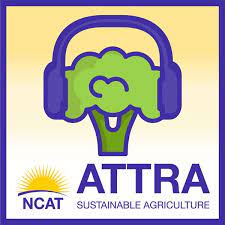Voices from the Field is a podcast series co-produced by ATTRA and SARE that explores the different ways farmers are working to create new local markets for specialty and niche crops. Each partner episode will address a different production system or crop–from endives to small-grain value chains–and will feature farmers sharing their production and marketing strategies, challenges and successes along the way.
"Chestnuts in Southeastern Ohio"
NCAT Sustainable Agriculture Specialist Tyler Jenkins dives into the world of chestnuts with Michelle Ajamian, who works with Rural Action as a network developer for Appalachian Staple Foods Collaborative. Ajamian discusses her efforts to establish a thriving market for chestnut growers in the region.
Resources:
- Demonstrating Higher Yields and Market Opportunities of Mixed Annual and Perennial Intensive Planting in Appalachian Ohio
- Producing Culinary Chestnut Flour with Michelle Ajamian and Amy Miller
- Consider Chestnuts: A Potential Perennial for Market Farms
- Rural Action
- Appalachian Staple Foods Collaborative
"Edible Landscaping"
In this episode, NCAT Horticulture Specialist Guy Ames talks with Matthew Lebon, owner of Custom Foodscaping in St. Louis, Missouri.
Guy and Matthew talk about “edible landscaping” – which includes plants that produce food in residential, business, and community landscapes. They also discuss the value of “uncommon” crops such as gooseberries, currants, and paw-paws that grow well in the region.
Related SARE Resources:
Other Related Resources:
- Local Food Systems
- How to Start Community Agroforesty Projects: Advice from 11 Forest Gardens
- Custom Foodscaping
"Building Local Food Systems in Montana"
In this episode, Maura Henn, an NCAT Local Food Systems Specialist, talks with Michal DeChellis of the Alternative Energy Resources Organization (AERO) in Montana. The episode focuses on building resilient community food webs and connecting communities to local food solutions. Michal is AERO’s Program Manager for the Montana Food Economy Initiative (MFEI), a project that has been funded through a Western SARE Grant.
Related SARE Resources:
Montana Food Economy Assessment
"Breeding Squash for Disease Resistance and ‘Eating Quality’"
In this episode, NCAT Sustainable Agriculture Specialist Justin Duncan talks with Edmund Frost at the Twin Oaks Intentional Community in Virginia. Edmund is the managing director of Common Wealth Seed Growers, a cooperative of seed growers producing farmer-grown, regionally trialed seeds in the Southeast.
Since 2013, Edmund has received funding from Southern SARE for research and breeding work with butternut squash. Justin and Edmund talk about breeding strategies to produce butternut squash that is resistant to downy mildew while still maintaining its eating quality. They also discuss how Edmund conducts taste tests of the squash and how he gathers the data from his research.
Related SARE Resources:
Breeding and Evaluation of Butternut Varieties for Southeast Organic Farms
Winter Squash Evaluation and Improvement for Downy Mildew Resistance and Fruit Quality
Identifying and Marketing Open-Pollinated and Organic Cucurbit Seedstocks for Virginia
Related ATTRA Resources:
Squash Bug and Squash Vine Borer: Organic Controls
Organic Pumpkin and Winter Squash Marketing and Production
"The Commercial Potential of Mulberries in the Midwest"
If you’re curious about new opportunities in tree fruit production for your farm, listen as Ohio farmer Weston Lombard talks about his experience with mulberries. In it, Lombard and NCAT Sustainable Horticulture Specialist Guy Ames discuss the commercial possibilities and challenges mulberries present, along with different cultivars and growing strategies.
Lombard was a SARE Farmer/Rancher Grant recipient in 2016 for the project Field Testing the Mulberry for Commercial Production in the Midwest. He has successfully incorporated mulberries into the agroforestry system on his farm, where harvested leaves and dropped fruit provide excellent forage for chickens and hogs. His main income streams are through u-pick events and by propagating and selling nursery stock.
Related SARE Resources:
Field Testing the Mulberry for Commercial Production in the Midwest
Sustainable Agriculture Solutions for Appalachia: Mulberry Agroforestry
Mulberry Production with Weston Lombard
Related ATTRA Resources:
Fruit Trees, Orchards, and Vines for Natural Growing in the Ozarks
Community Forest Gardens: Case Studies Throughout the United States
Subscribe to ATTRA-Voices from the Field wherever you get your podcasts.
This material is based upon work that is supported by the National Institute of Food and Agriculture, U.S. Department of Agriculture through the Sustainable Agriculture Research and Education (SARE) program. Any opinions, findings, conclusions, or recommendations expressed in this publication are those of the author(s) and should not be construed to represent any official USDA or U.S. Government determination or policy.
